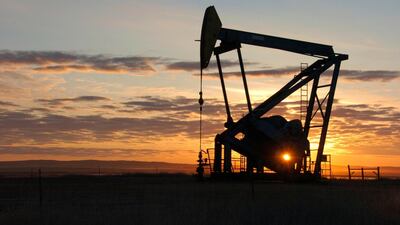Oil prices fell during early trading before rebounding as Opec+ cautioned against a volatile oil market and vowed to maintain tapered production cuts from the start of 2021.
Brent, the international benchmark was down 0.02 per cent at $42.61 per barrel at 3.50pm UAE time. West Texas Intermediate, which tracks US crude grades, was up 0.05 per cent, trading at $40.85 per barrel.
The benchmarks fell during early trading as they factored in the group's resolve to maintain the tapering of cuts agreed to during their meeting in April.
"The latest Joint Ministerial Monitoring Committee [JMMC] meeting of Opec+ issued a cautious outlook on the oil market,” Giovanni Staunovo, a commodity analyst with UBS, said.
"With the group observing a slowdown of the economic recovery due to a resurgence of Covid-19 cases, the precarious market conditions and prospects require Opec+ to remain vigilant and proactive,” he added.
The group is currently drawing back 7.7 million barrels per day from the oil markets. Tapered restrictions are set to remain in place until April 2022, with the JMMC making no recommendations to deepen or change the current volume of restrictions.
At the height of the mobility restrictions induced by the Covid-19 pandemic, the group agreed to cut an historic 9.7m bpd from the markets between May and July to reverse a record crunch in oil demand and prices.
At the JMMC, Saudi Arabia’s energy minister Prince Abdulaziz bin Salman said Opec+ “has work to do” in terms of addressing compensatory cuts by the alliance's oil producers but stressed the group is committed in its efforts to stabilise the energy markets
“Nobody in the market should be in any doubt as to our commitment and our intent,” Prince Abdulaziz said.
His Russian counterpart, Alexander Novak, said the industry could face more turbulence despite the alliance's achievement to ensure stability.
"Despite the stability, which we're seeing today, it is clear that the market is much more volatile. The virus has already caused a loss or damage to many sectors of the economy," Mr Novak told delegates at the JMMC.
The group said in its latest meeting that it achieved an overall conformity level of 102 per cent, which is the highest since May, excluding voluntary commitments made by Saudi Arabia, the UAE and Kuwait.
Laggard producers within the group also made up for shortfalls in September by drawing back a total of 249,000 bpd for earlier overproduction.
"While the terms of the current Opec+ deal were not discussed according to delegates, we continue to believe that Opec+ will postpone the planned production increase early 2021 by a few months,” Mr Staunovo said.
He cited Mr Novak’s comments about “uncertainties” in the market that are likely to impede market recovery to “pre-crisis levels”.
“The demand recovery is slow,” he added.
Opec+ is likely to see a higher level of production hitting the markets as key producer Libya is likely to add its barrels, with production in the North African state rising about half a million bpd since mid-October, from a base of 300,000 bpd.
UBS expects Brent to average $45 per barrel by December and $50 per barrel by the end of the first quarter of 2021.


